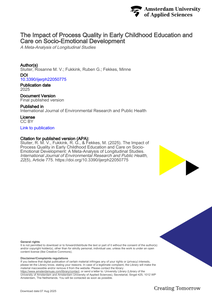This dissertation describes the dynamics of motor competence (MC) development from early childhood (EC) to middle childhood (MCD). Being motor competent in early childhood creates a window of opportunity for taking part in physical activities later in childhood and adulthood. However, there is a worrying trend in MC development during childhood. This trend shows that, last decades, children struggle more with executing fundamental movement skills (e.g., hopping, dribbling, balancing, throwing and catching) and that general motor fitness levels of children are decreasing. A delay in MC development during childhood has a negative impact on the general health status later in life. Therefore, it is important to support young children to develop their MC. The main research question of this dissertation was: How can motor competence be promoted as efficient and effective as possible in early childhood by sport professionals? Chapter 2 showed that MC development from early to middle childhood proceeds with variation. The majority of the children had a stable ‘normal’ or increasing ‘high’ development of MC over time. However, a concerning level of 18.2% of the young children showed an undesirable pattern (i.e., a negative course of motor development over time and a ‘low’ MQ score during the final measurement) of MC development as they grow older. Chapters 3 and 4 showed that characteristics of the social and physical home environment and direct living environment were associated with MC disparities during early childhood. Both parenting practices and parental PA-involved behaviours were relevant modifiable factors. For example, stronger parental active transportation routines and PA parental practices decreased the odds of a lower MC. Also, the presence of a home garden decreased the likelihood of children being classified as low motor competent. With regard to gender differences, girls showed lower levels of MC compared to boys. Special attention should also be paid to obese children as they experience less enjoyment of PA compared with normal weighted peers (chapter 3). Excessive body weight is also a risk factor associated with an undesirable MC development, just like lack of sports participation (chapter 5). Intervention strategies (chapter 6) incorporating all fundamental movement skills with a great variety of activities for at least 3 to 4 times a week seem to be most effective to stimulate MC development. Methodological and didactical aspects like deliberate practice and play should be implemented together with training and coaching sessions for sport professionals to increase the effectiveness of the interventions. With respect to the efficiency of promoting MC development, policy makers and sport professionals should pay more attention on early childhood and especially focus on those children at risk for a delay in MC development. So, overweighted children and children not participating in organized sports should be given more attention by sport professionals. Additionally, the effectiveness of MC interventions can be increased by making use of the home environment, childcare context and school context of young children. Sport professionals can act as connectors between parents, school, and sports clubs.
DOCUMENT

This study evaluated the Toddler Oral Health Intervention (TOHI) for preventing early childhood caries (ECC) by 48 months. TOHI, an add-on to standard care in well-baby clinics (WBCs), aims to reduce ECC incidence and severity.
MULTIFILE

We investigated the relationship between process quality in early childhood education and care (ECEC) and children’s socio-emotional development in a meta-analysis of longitudinal studies. Our multi-level meta-analysis of 31 publications reporting on 16 longitudinal studies (N = 17,913 children, age: 2.5–18 yrs) demonstrates that the process quality of ECEC is a small but significant predictor of children’s socio-emotional development over time (ES = 0.103, SE = 0.026, p < 0.001, 95% CI: 0.052–0.155). This longitudinal association extends to the age of 18 years in our sample. Process quality of ECEC is, thus, a significant and stable predictor of children’s socio-emotional development and well-being from toddlerhood to adolescence. The longitudinal relationship was moderated by the type of care (center-based vs. home-based) and the informant (parent, professional caregiver, external assessor, or self-report of the child). Implications for future ECEC research are discussed.
MULTIFILE
